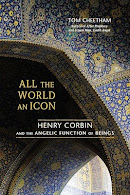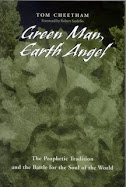"...the Imagination (or love, or sympathy, or any other sentiment) induces knowledge, and knowledge of an 'object' which is proper to it..."
Henry Corbin (1903-1978) was a scholar, philosopher and theologian. He was a champion of the transformative power of the Imagination and of the transcendent reality of the individual in a world threatened by totalitarianisms of all kinds. One of the 20th century’s most prolific scholars of Islamic mysticism, Corbin was Professor of Islam & Islamic Philosophy at the Sorbonne in Paris and at the University of Teheran. He was a major figure at the Eranos Conferences in Switzerland. He introduced the concept of the mundus imaginalis into contemporary thought. His work has provided a foundation for archetypal psychology as developed by James Hillman and influenced countless poets and artists worldwide. But Corbin’s central project was to provide a framework for understanding the unity of the religions of the Book: Judaism, Christianity and Islam. His great work Alone with the Alone: Creative Imagination in the Sufism of Ibn ‘Arabi is a classic initiatory text of visionary spirituality that transcends the tragic divisions among the three great monotheisms. Corbin’s life was devoted to the struggle to free the religious imagination from fundamentalisms of every kind. His work marks a watershed in our understanding of the religions of the West and makes a profound contribution to the study of the place of the imagination in human life.Search The Legacy of Henry Corbin: Over 800 Posts
Tuesday, October 11, 2016
- Egil Asprem
Correspondences 4 (2016) 1–34
ISSN: 2053-7158 (Online) correspondencesjournal.com
Abstract Scholars agree that the imagination is central to esoteric practice. While the esoteric vis imaginativa is usually attributed to the influx of Neoplatonism in the Italian Renaissance, this article argues that many of its key properties were already in place in medieval scholasticism. Two aspects of the history of the imagination are discussed. First, it is argued that esoteric practice is rooted in a broader kataphatic trend within Christian spirituality that explodes in the popular devotion literature of the later Middle Ages. By looking at the role of Bonaventure’s “cognitive theology” in the popularization of gospel meditations and kataphatic devotional prayer, it is argued that there is a direct link between the scholastic reconsideration of the imaginative faculty and the development of esoteric practices inspired by Christian devotional literature. Secondly, it is argued that the Aristotelian inner sense tradition of the scholastics left a lasting impression on later esoteric conceptualizations of the imaginative faculty. Examples suggesting evidence for both these two claims are discussed. The article proposes to view esoteric practices as an integral part of a broader kataphatic stream in European religious history, separated out by a set of disjunctive strategies rooted in the policing of “orthopraxy” by ecclesiastical authorities.
and this is very worthy of note:
– February 20, 1981
by James Engell
Subscribe to:
Post Comments (Atom)







No comments:
Post a Comment